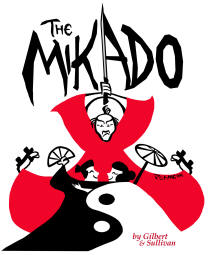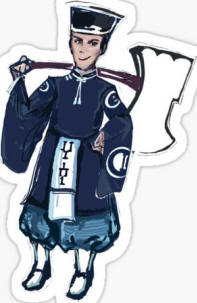

|
Merely corroborative detail, intended
to give artistic verisimilitude Poo-Bah |
10/2014
D Vautier
 In the fall of 1963 Don
Bosco
College, a major religious seminary in Newton, NJ, embarked upon an ambitious
project to perform the famous Gilbert & Sullivan play The
Mikado, adapting it for an all male cast.
To my knowledge this had never been attempted before at least not on such a
grand scale and using almost the entire ensemble of music.
My involvement first started
when I somehow stumbled (or was stumbled) into a committee whose
assignment was to modify the play and make it work for an all male cast.
In the fall of 1963 Don
Bosco
College, a major religious seminary in Newton, NJ, embarked upon an ambitious
project to perform the famous Gilbert & Sullivan play The
Mikado, adapting it for an all male cast.
To my knowledge this had never been attempted before at least not on such a
grand scale and using almost the entire ensemble of music.
My involvement first started
when I somehow stumbled (or was stumbled) into a committee whose
assignment was to modify the play and make it work for an all male cast.
I was then carried along with this huge effort, originally inspired by our drama director Fr. Spano, who soon engaged the full time efforts of Fr. Herzog, the music director. My job was to direct rehearsal of the choir and we almost finished act one when I was asked by Fr. Herzog to play bassoon for the orchestra.
The play is an entangled love story--well
actually, two love stories, so this remained a serious logistics problem
from the beginning, and involved a great deal of editorial privilege. We decided to use all sorts of imagination
stretching contrivances. The
cast members turned out to be cousins or wards or nephews or uncles.
Three little boys from school sang funny little girly songs.
Jilted lovers turned out to be jilted monks.
Jaded relationships degraded into jealous and even questionable
masculine relationships, but since it was all for fun, much latitude was
given to such editorial excess. Eventually we only had to drop a few very
good songs that couldn’t possibly work, such as Comes a Train of
Little Ladies, and Braid the Raven Hair but we did leave
these melodies in the overture.
 The heavily modified all-male conversions
reminded me of a joke my mother used to tell about a Catholic
boys school and a Catholic girls school across the street from each
other. When the girl’s
school got a movie the good nuns edited out all the boys.
When the boys school got the movie the good nuns edited out all
the girls so what you had left were just the horses.
The heavily modified all-male conversions
reminded me of a joke my mother used to tell about a Catholic
boys school and a Catholic girls school across the street from each
other. When the girl’s
school got a movie the good nuns edited out all the boys.
When the boys school got the movie the good nuns edited out all
the girls so what you had left were just the horses.
 And
if you remain callous and obdurate I,
And
if you remain callous and obdurate I,
Shall parish as he did and you will know why,
Though I probably shall not exclaim as I die,
“Oh willow, Tit willow, Tit willow!”
Play Director –
Fr. Spano
The Mikado - David Purdy
NANKI-POO (his Son, disguised as a wandering minstrel – Russell
Sullivan.
KO-KO (Lord High Executioner of Titipu). Paul Shehan
POOH-BAH (Lord High Everything Else). Mike Kelley
PISH-TISH (a Noble Lord).
Three Wards of Ko-Ko:
YUM-YUM – Ray Xifo
PITTI-SING – Mike Fisher
PEEP-BO ??
KATISHA (an elderly Monk with claim on Nanki-Po. Jerry Harasyn
Chorus of Nobles, Guards, and Coolies.
The Orchestra
Music Director - Fr. Herzog
Stage Director - Fr. Spano
Organ - ? Jim Rotunno
Sax – Joe Tortorici
Bassoon – me
Base viol ???
The play was only performed three times much to everybody’s disappointment and actually received critical acclaim in the local papers. The modified words and score were eventually passed on to some of the aspirentates and portions of it made their way into other seminaries on the east and west coast.
There were many fine pictures taken of the cast, crew and orchestra. I have seen these pictures featuring the Mikado, Ko-Ko, Pooh-bah, and Nanki-poo. I don’t know what ever happened to them.
In the play an unfortunate Co-co (played by Paul Shehan), had to pursue the hand of the ungracious and ill-tempered Katisha (KA-ti-sha) in order to save his own neck at the hands of the emperor's decree. During his wooing of Katisha he does a short ballad to soften things up called Titwillow.
The reason I remember this scene so well is because the song has a solo flute accompaniment on the next to last line of each verse. We had no flute in our orchestra so Fr. Herzog had me to do the flute part on bassoon. It turned out to be so cool.
With a shake of his poor little head he replied,
Oh willow, titwillow, titwillow!
I remember other moments during that play, especially some of my bassoon duets with the singers where again I got to play the flute part.
Mikado singing with just base viols and organ:
My
object all sublime
I shall
achieve in time
To make
the punishment fit the crime
The
punishment fit the crime
Then Mikado singing with bassoon:
Full chorus:
His object all sublime…
I remember other incidents that occurred
during rehearsal. Jerry Harasyn could not get
the choreography during his dramatic plea for the
love (friendship) of Nanki Po
Give me my place Oh rash, Oh base!
In another incident David Purdy could not get the laugh right in A more Humane Mikado. Fr. Spano told him, “David, That’s not good enough.” Next practice Purdy had a better laugh and again Fr. Spano said “David, that’s still not good enough.” After the third time he had a laugh that was soooo good and soooo funny that it blew us all out of our seats. Here is what it probably sounded like:
 On a cloth untrue
On a cloth untrue
With a twisted cue
And elliptical billiard balls!
(OUTRAGEOUS LAUGH)